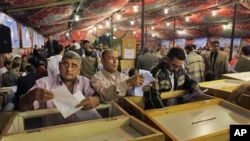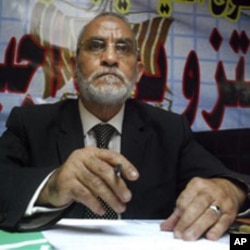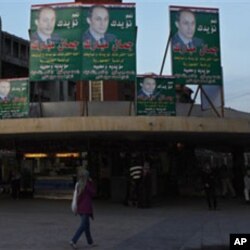Results from the latest round of Egypt's parliamentary elections are due on Tuesday, but already Egyptian-Americans are saying another chance has been lost for a more open democracy in their former homeland. The pessimism comes after two rounds of balloting - the first in late November and the second this past Sunday - both highlighted by widespread allegations of voter harassment and vote count irregularities.
The first round of the Egyptian parliamentary elections resulted in a landslide victory for President Hosni Mubarak's ruling National Democratic Party, with the opposition candidates winning the smallest number of seats in 20 years. Egyptian election observers reported widespread allegations of vote rigging and intimidation of opposition candidates.
State Department spokesman Philip Crowley said the United States was dismayed by reports of election irregularities. "We believe that the elections fell short of the expectations that the Egyptian people have for what they want to see in terms of open political process, a chance to play a more significant role in the future of their country and a chance to participate more fully in the political process," he said.
Egyptian election officials had disqualified the popular Muslim Brotherhood, a party that won 20 percent of the parliament seats in 2005, and also Al Wafd, the oldest liberal party in Egypt. Both parties boycotted the runoff elections this past Sunday. Even so, Egyptian government officials have rejected claims of election bias, and Prime Minister Ahmed Nazif went further, describing the parliamentary balloting as the best in Egypt's history.
'Throwback'
Michele Dunne is Editor-in -Chief of the Arab Reform Bulletin at the Carnegie Endowment for International Peace in Washington.
"What this is going to mean is a throwback to the kind of parliament that Egypt had, frankly, 20 years ago, like in 1990 for example, when the opposition boycotted the elections, so there were only a few opposition representatives. I think that the people's assembly that we will now see is going to enjoy very little legitimacy in the eyes of Egyptians," he said.
Dunne says Egypt's ruling party appears to be setting the stage for next year's scheduled presidential elections. President Mubarak is 82-years-old and has held office for almost three decades. He is believed to be grooming his son, Gamal, to succeed him - a move expected to spark widespread opposition.
Egyptian-American activist Nadine Wahab is a board member of the pro-democracy Egyptian Association for Change. She says the irregularities reported in the latest parliamentary voting could spur Egypt's opposition to work harder in next year's presidential campaigning.
"I do think it will impact next year's presidential elections," said Wahab. "But I also think that with the protests in the lead up to it, and with the outcry of post elections and the articles and some of the organizing that is happening it could be a tipping point for activists and regular Egyptians to begin to realize the importance of a free and democratic Egypt and to be able to call for reform and push for reform that would allow for a free and fair elections."
Calls for political reform
Ayman Adhair runs a management and technology consulting business in the state of Virginia just outside Washington D.C. He agrees that the latest problems with the Egyptian election process could result in more insistent demands for political reform. Adhair is especially hopeful that civic groups and the society at large in Egypt get involved in seeking political reform.
"These groups -- whether they are non-governmental organizations, civil society groups, the media, and parents at home -- need to work in tandem to accelerate such a process. It is not just one person, or one group or one party but it is the whole community that need to work together to achieve this," said Adhair.
As for the U.S. role in helping democracy in Egypt, Adhair believes that rather than stepping up pressure on the Egyptian government, the Obama administration should be helping the Egyptian people by training civil society organizations and encouraging improvements in Egyptian government transparency.
An alliance of Egyptian-American activist groups is pushing for a court decision in Egypt to allow Egyptian-Americans and some 7 million other Egyptian expatriates to vote in next year's presidential elections. If that request is granted, proponents believe they could have a major impact on the outcome and prevent a replay of the recent parliamentary elections.






